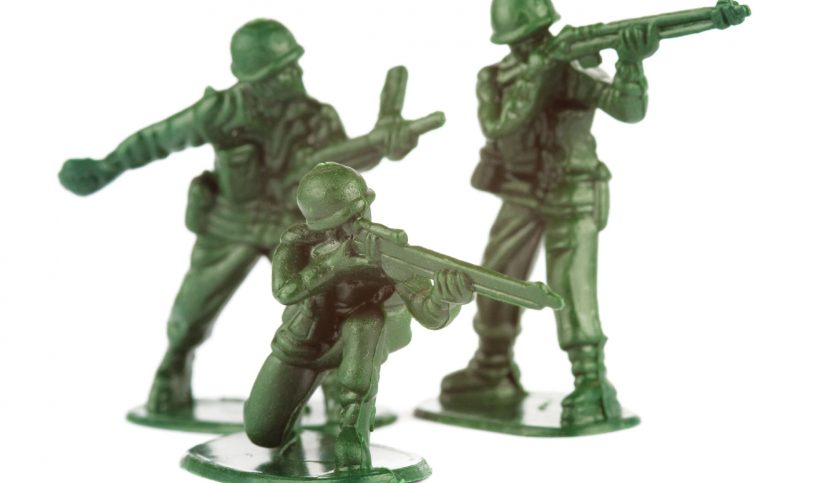By Abrar Al Shammari
Red: too loud. Blue: too mellow. Green: too environmental. Yellow: too cheerful. Pink: too girly. Purple: just a darker shade of pink. Black: too glum. Giraffe: too exotic. Cat: too furry. Monkey: scary in the dark. Scooby Doo: too old school. Mummy: likely to trigger nightmares. Batman: too – “WAHHHH!”
My train of thought screeches to an abrupt stop when the sound of a miniature demon’s screams invade my ears. Part of me wants to grab one of the large lollipops on display and stuff it in his mouth; another part of me deeply sympathizes with the wretched toddler’s pitiful parent.
Naser, a young father, is walking away from the toy stand where he had just returned one of the toys that his toddler Hamad was obviously begging for. The toddler is standing in front of the toy with his arms outstretched, the toy placed too high for him to reach; he screams for it. This only lasts for a few seconds, as he realizes that he should be screaming at the man who took away his toy in the first place. His father’s stride is firm and unrelenting, and he walks away from both the toy and the toddler without looking back.
The toddler charges at his father’s leg and clings to his jeans. He digs his little nails so deeply into him that it makes his father hiss in pain and frustration, reaching down to release his son’s hands from his leg. As Naser walks away once again, the child wipes his wet nose and tearful eyes with his shirt, and approaches one of the store’s employees, dragging him by the hand to where the toy is, and points to it. The employee naively hands it to him with a smile, and the boy gleefully skips away to the cashier where his father is standing, not understanding that his father has to be willing to pay for the toy if Hamad wants to take it home with him.
At the cashier, his father had been paying for two other toys, looking calm and collected, seemingly unfazed by Hamad’s tantrum. Naser’s composure is completely thrown off the moment his son excitedly places his toy on the counter with an expression of victory on his childish features; his father’s face, on the other hand, is seized by a newfound fury. His yelling vibrates from deep within his chest, “Ghasib? How many times did I tell you to put it back? I’m not going to ask you again, Hamad!”
The boy’s sniffles and wails renewed, he picks up the toy and shuffles toward the aisle he found it in with the lethargy of a man walking to his execution. Giving it one last longing gaze, he walks back with slumped shoulders to his father, who is having a no-nonsense conversation with the boy’s mother.
“Naser, habeebi, just let him have it.” Her husband stands his ground; no army toys will come into his house.
Silenced, his wife surrenders, and shakes her head at their son, gesturing for him to give up the fight too. Her husband was hoping he would not have to explain, but she had pushed him, and that one statement alone had shamed her and boiled the blood in his veins. Their son does not understand, but someday he will, and someday he will thank him. He is a three-year-old boy born in 2010, during an age of privilege, wealth and comfort, in a safe country that has not experienced war in thirteen years, the 1990 invasion being the only true event of war it has experienced in the entirety of its history. He knows nothing of war, and as of yet, he does not understand his own name. He does not know that he was named after his grandfather Hamad, one of the hundreds of POWs killed at the hands of soldiers, puppeteered by dictators. He will never experience the loneliness of growing up without a father, and the bitterness of knowing it could have been prevented.
Naser is determined for his father’s death not to be forgotten – but also for it not to be reborn. Not in his son’s ideology, not in his country’s politics, and not in the era of the generation that has the chance to change what their forefathers could not.
Yes, saying no to toy soldiers narrows down a boy’s options when it comes to playing. Nearly every aisle in the “boys section” is lined up with soldiers, police officers, wrestlers, and other violent figures of authority; glorified with muscles, heroic titles, aesthetic weapons and tanks. The ‘real world’ apart from toy stores does more than enough of this: media entities, government institutions, educational systems. It will be easier for a child to resist this mindset if by the time he is introduced to them, he is already anti-war, and sees nothing but the destructiveness of it. It is more constructive to introduce children to toys that encourage them to think, and that don’t impose ideologies on them; this should be a period of time that enables their brains to develop well enough to weigh different views, and see which one is the most beneficial to them as world citizens.
I, for one, ended up leaving the toy store with a puzzle – literally and metaphorically.











